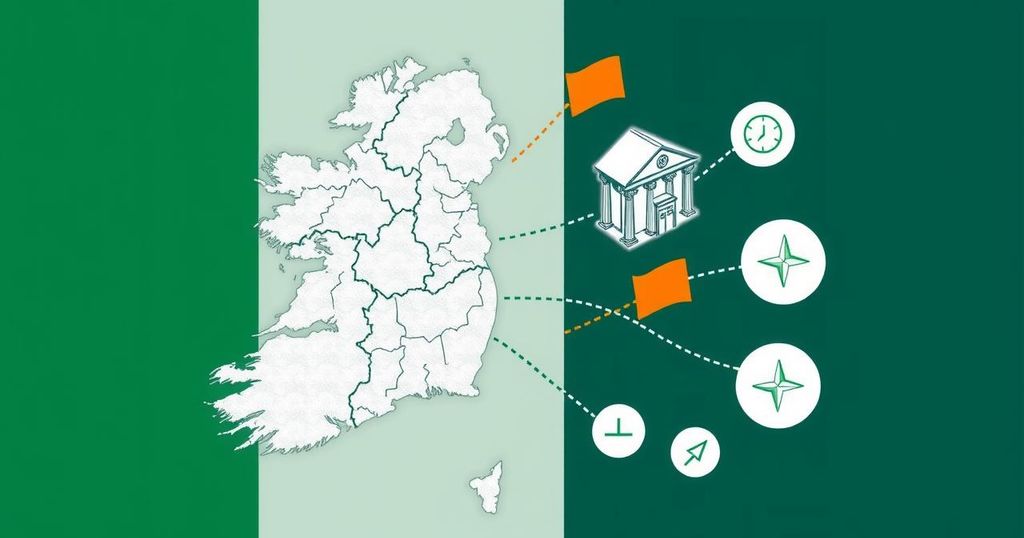World news
ASIA, CHARLOTTE FALLON, COMMUNITY RELATIONS, CORK, DOWNING STREET, ELECTION, EUROPE, FALLON, FIA, GOVERNMENT, GREENS, HARRIS, IMMIGRATION POLICY, IRELAND, LABOUR, LONDON, MIDDLE EAST, POPULISM, REPUBLIC OF IRELAND, SIMON HARRIS, SINN FEIN, THE TIMES, UNITED KINGDOM
Fatima Alavi
0 Comments
Ireland’s Elections Complicated by Prime Minister’s Misstep
The upcoming elections in Ireland have become contentious due to a recent misstep by Prime Minister Simon Harris, who faced backlash for his handling of a conversation with a voter. While Fine Gael’s poll numbers are declining, Sinn Féin is gaining momentum, leading analysts to speculate on the potential reshaping of Ireland’s political landscape, although a coalition government may still emerge.
The political landscape in the Republic of Ireland has taken an unexpected turn as Prime Minister Simon Harris finds himself in hot water following a contentious interaction with a voter. In the lead-up to Friday’s elections, the situation has heightened scrutiny on his coalition government, which had previously enjoyed stable approval ratings. Traditional rivals, Fine Gael and Fianna Fáil, appear to be facing challenges, with Sinn Féin gaining traction among the electorate amid dissatisfaction toward current policies, particularly those affecting vulnerable communities. Despite these developments, experts predict that a coalition government composed of Fine Gael and Fianna Fáil may still prevail, albeit with diminished support.
The Prime Minister’s recent experience in a supermarket has startled political observers, as a confrontation with voter Charlotte Fallon went viral, highlighting potential weaknesses in his administration. Ms. Fallon criticized Mr. Harris for not adequately supporting individuals working with disabled persons. His terse response—an abrupt handshake followed by his retreat—has raised concerns among political analysts regarding his leadership. This incident not only reflects the challenges he faces but also signals a possible shift in voter sentiment ahead of the elections.
Despite the growing tensions within the electoral campaign, the primary political bloc is still anticipated to maintain control. However, polling data indicates a troubling decline for Fine Gael, with Sinn Féin’s advances presence indicating an evolving dynamic within Irish politics. The coalition government, if formed, may need to include additional support from smaller parties to ensure a secure majority, as the electorate’s appetite for change intensifies.
Harris’s unique misstep may serve as a pivotal moment, challenging the established political norms that had previously buoyed the coalition. The fallout from this incident may signal a broader yearning for policies that resonate more acutely with the experiences of ordinary citizens, potentially reshaping the future of governance in Ireland.
The political situation in the Republic of Ireland has traditionally been dominated by two centrist parties, Fine Gael and Fianna Fáil, which have formed a coalition government since 2020. This coalition has managed to navigate a relatively stable political climate in a region where governments often face electoral upheaval. However, the rise of Sinn Féin, the main opposition party embracing nationalist sentiments, poses a challenge as they push for increased support and representation, especially for marginalized groups. Recent events, particularly the public dissatisfaction with government responsiveness, have amplified calls for change leading up to the upcoming elections.
In summary, Prime Minister Simon Harris’s mismanagement of a recent voter interaction has cast doubt on his leadership and could impact Fine Gael’s performance in the elections. Despite this setback, political analysts expect the traditional coalition of Fine Gael and Fianna Fáil to maintain its hold on power, albeit under increased pressure from Sinn Féin, reflecting a potential shift in public sentiment. The evolving electoral dynamics in Ireland may demand a new approach to governance, prioritizing citizen engagement and addressing critical social issues more effectively.
Original Source: www.nytimes.com




Post Comment